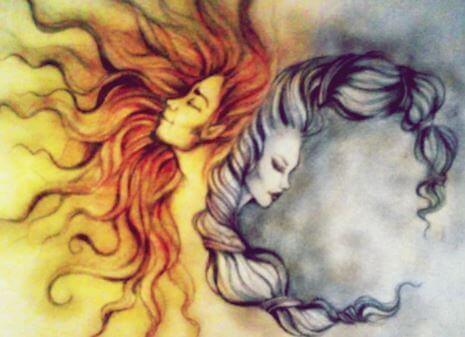The Reasons Behind Impossible Love


Written and verified by the psychologist Raquel Aldana
What are some of the reasons behind impossible love? Need, admiration, pain, love, caring, compassion for another, and emotional dependency are all factors. There are an infinite number of ways to respond to this question.
Since time immemorial, impossible love stories have filled our hearts, shelves, and walls. The greatest literary and artistic successes speak of the pain of impossible love that breaks down or simply never existed outside of their minds.
Romeo and Juliet, La Celestina, The Princess Bride, Don Juan Tenorio, and The Sorrows of Young Werther. These are some of the greatest literary successes that we all remember as stories of the love and heartbreak of youths destined to never be together.
Fairy tales, Disney movies with their eternal love, and soap operas with hundreds of twists before a happy ending. These have all made us believe that love is all powerful and that everything will inevitably end well.

However, nothing could be further from the truth: not all love is possible and not all love must be fought for. For this reason, it’s sometimes better to let go of what is unattainable.
As you might have guessed, this literary and artistic ingredient guarantees success as it has a good advantage: we can all identify with the impossible love. But why?
Why do we love people that we can’t have?
Endless love is exhausting, maddening and destructive. But unfortunately, our emotional development hasn’t been strong enough to avoid this type of suffering and we bury ourselves in shards of broken glass that do nothing but damage us.
Maybe it’s the fault of the romanticism that comes from believing we are on the right path despite the pain we feel at the bottom of our heart. But what’s happening to us? Why do we keep feeling this impulse, this fatal attraction? Here are some of the reasons:
1. Emotional anxiety
Sometimes we want and need someone to be close to, whoever they may be, just to be with us and reassure us. This need causes a great deal of anxiety that can only be calmed by having the object of our desire nearby.
When this person isn’t there, the anxiety grows and grows, causing the person suffering to constantly search for their love to calm down. According to psychologists Cindy Hazan and Phillip R. Shaver, this is really unhealthy.
See also: Reduce Anxiety with These 5 Calming Remedies
2. Our ideas of romanticism: fighting against the odds
As we said before, we’ve been taught that love is being there through thick and thin. But do we have to take everything that comes? If we do, it’s not by choice, but because we’re forced to by our beliefs (which can be both untrue and harmful).
3. The attention
It’s simple. Although it’s hard for us to believe, sometimes we fall hopelessly in love with someone only because they paid us a little attention. This obviously speaks to a multitude of emotional needs and the need to feel accepted.
4. Wanting, yet not wanting
Oddly enough, some people fall for impossible love because they want to avoid intimacy. These evasive people tend to live in an ideal fictional reality where their love can remain idealized.
According to psychologist Linda Hatch, “They seek out relationships in which the other person will reject or abandon them. It’s a way of feeling ‘safe’ from the vulnerabilities of real intimacy. Closeness with another person becomes something perceived to be dangerous.”
5. The unattainable person increases their value
This is the ideal of platonic love as unrequited love. Hector G. Barnes affirms, “The logic is clear: Limited resources raise the value and abundant resources lower it.”
The same product becomes a luxury because we can’t have it. Who could be more exclusive than a committed person that never abandons the relationship? Or more desirable than a somebody that everyone wants (e.g. an beautiful actress, or or the most handsome guy in the class)?
6. Admiration
In love, there should be mutual admiration. However, there are “loves” in which the admiration only goes one way. In these cases, that is the reason that sustains the desire. Any relationship that begins exclusively, for this reason, is doomed to break down, and cause pain for the one doing the admiring.

Is it really love?
As we’ve seen, impossible love can answer a multitude of questions. Each individual case will have its own reasons and emotions. What’s clear, however, is that it isn’t a healthy kind of love.
Love is not just happiness, but also possibility. Sometimes the only thing binding us to this feeling is the adrenaline rush and having something to live for.
See also: The Proofs of Love: How solid is your relationship?
How can we overcome impossible love?
The first step is recognizing that even though we’re attracted to them, we might not be able to live a healthy, constructive and satisfactory life with this person.
We need to realize that idealization is a natural step in the process of falling in love, but even this is, little by little, exhausted. It’s important to understand that people don’t correspond to the prototypes or ideals of perfect love. Our choice in partners should be based on who they are and not ideals.
This doesn’t mean that we can’t be romantic or that our partner or relationship can’t meet some of those ideals. It is possible and desirable to make it happen, but there are some non-negotiable principles that we shouldn’t forget.
All cited sources were thoroughly reviewed by our team to ensure their quality, reliability, currency, and validity. The bibliography of this article was considered reliable and of academic or scientific accuracy.
- Bauman, Z. (2012). Amor líquido: acerca de la fragilidad de los vínculos humanos. Fondo de Cultura Económica.
- Branden, N. (2000). Psicologia del Amor Romantico. Paidós.
- Hazan, C., & Shaver, P. (1987). Romantic love conceptualised as an attachment process. Journal of Personality and Social Psychology, 52, 511-524. https://psycnet.apa.org/record/1987-21950-001
- Sanpedro, P. (2005). El mito del amor y sus consecuencias en los vínculos de pareja. Disenso, 45, 5-20.
This text is provided for informational purposes only and does not replace consultation with a professional. If in doubt, consult your specialist.








